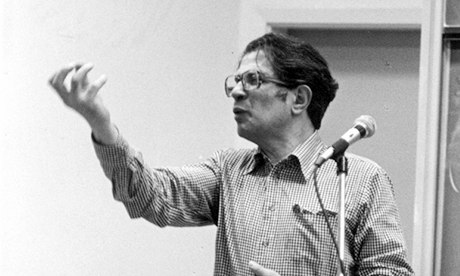
Just a thought, but perhaps we should ignore the foul things the Daily Mail is writing about Ed and David's dad, Ralph Miliband, and instead read his books. In 2013, they still repay attention. Here are some of his leading ideas:
1. Labour
The Labour party isn't radical enough and needs changing if it's to deliver socialism rather than collude with the financial interests of the City and US foreign policy. In Miliband's first book, Parliamentary Socialism (1961), he argued that it might be possible to make Labour truly radical. After witnessing Labour in power from 1964-70, he grew more sceptical, arguing that a new party of the left was needed. Ed, you might think, doesn't agree with his dad on this.
2. Consciousness
Vexingly for Miliband, the mass of working-class people (not to mention office workers, whom he called the quasi-proletariat) are not socialists. The problem with the Labour party, he thought, was that it got in the way of helping people understand the relevance of socialist policies to their needs. Ralph Miliband died in 1994, so didn't live to see how the Blairite revolution made Labour even more averse to raising the proletariat's class consciousness, but it would doubtless have given him the pip.
3. State
In his classic The State in Capitalist Society, Miliband wrote: "In an epoch when so much is made of democracy, equality, social mobility, classlessness and the rest, it has remained a basic fact of life in advanced capitalist countries that the vast majority of men and women in these countries has been governed, represented, administered, judged, and commanded in war by people drawn from other, economically superior and relatively distant classes." These words were written in 1969, but, as we are ruled by a government dominated by daddy-bankrolled Etonians, they still seem somehow relevant.
4. Hegemony
Developing the notion of hegemony devised by Italian Marxist Antonio Gramsci, whereby the ruling class justifies the economic status quo as natural and beneficial to every social class rather than as an artificial social construct benefiting itself (think: pay freezes, zero-hours contracts etc), Miliband railed against apologists for state neutrality in class conflict. For what he called "liberal-pluralist" thinkers such as US political scientist Robert Dahl, elites were too diffuse, too competitive with each other, to form a coherent ruling class that bent the state apparatus to its interests. Miliband thought that naive, to put it mildly. For him the state was a form of class power.
5. Managerialism
Miliband distinguished owner-capitalism from managerial capitalism, noting managers are considered "less selfish, their impulses and motives are better, more socially responsible, more closely concerned with the public interest than old-style owner capitalism". This, he considered, is cobblers, and the recent history of banking (think: Fred the Shred) seems to bear him out.
6. Nepotism
"The spread of managerialism," wrote Miliband, "tends to reinforce the advantage of what Harold Laski used to call 'the careful selection of one's parents'." Miliband argued that notions such as meritocracy and equality of opportunities in advanced capitalist societies are chimerical. Nepotism and a pervasive anti-egalitarian ethos whereby it's who rather than what you know that is decisive for advancement, are more important in determining who rules whom. It wasn't essential for the formation of our current ruling class that many of its leading members trashed restaurants together as members of the elite, all-male Bullingdon Club, for example, but it didn't hurt.




.jpg?w=600)


